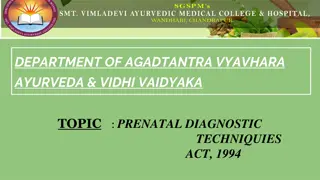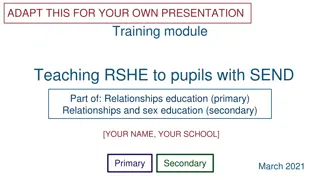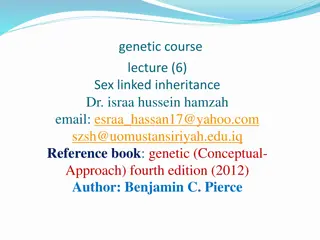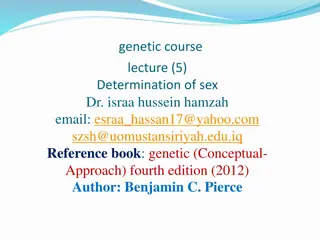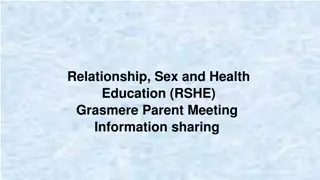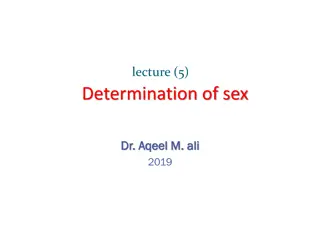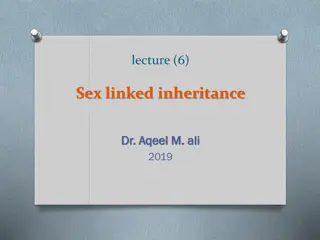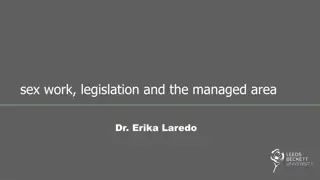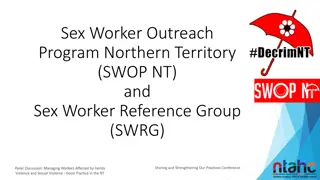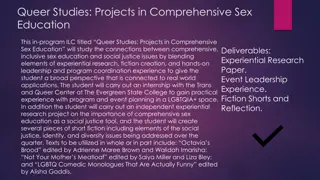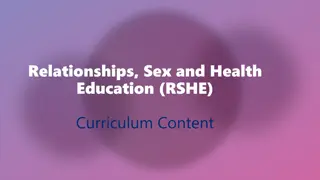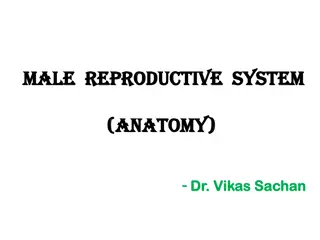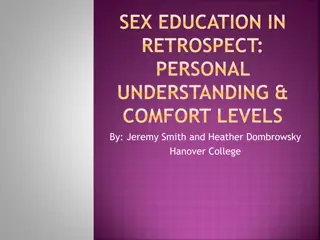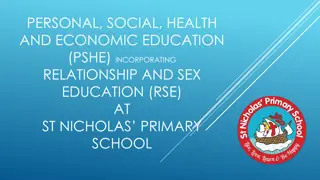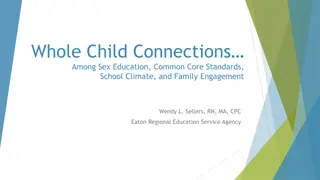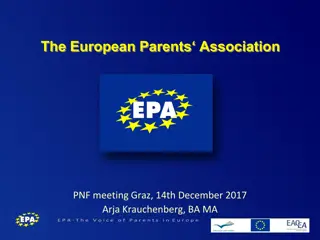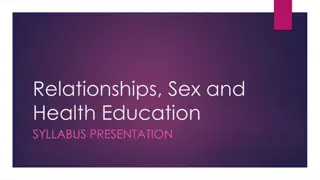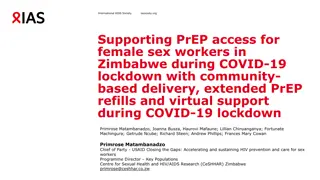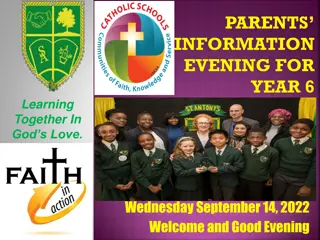Understanding Relationship, Sex, and Health Education (RSHE) for Parents
This session aims to inform parents about the updated government guidelines on Personal, Social, Health Education (PSHE) and RSHE, explain the importance of Relationship and Sex Education (RSE), share the RSE scheme of work, and outline parents' rights regarding withdrawal. It covers topics such as relationship education, health education, and why RSHE is important in creating a safe school environment and preparing children for physical and emotional changes.
Download Presentation

Please find below an Image/Link to download the presentation.
The content on the website is provided AS IS for your information and personal use only. It may not be sold, licensed, or shared on other websites without obtaining consent from the author. Download presentation by click this link. If you encounter any issues during the download, it is possible that the publisher has removed the file from their server.
E N D
Presentation Transcript
RELATIONSHIP, SEX AND HEALTH EDUCATION(RSHE) Parent session
PARENT SESSION OUTCOMES The aims of this session are to : share a brief overview of the updated government guidance on PSHE (Personal, Social, Health Education)/RSHE (Relationships, Sex and Health Education) explain what RSE is and how it links to our aims and values share the RSE scheme of work that will be taught across all year groups inform parents about their right to withdraw
GOVERNMENT UPDATE RELATIONSHIPS EDUCATION (RE), RELATIONSHIPS & SEX EDUCATION (RSE) & HEALTH EDUCATION(HE) 3
RELATIONSHIP EDUCATION (RE) Families and people who care for me Caring friendships Respectful relationships Online relationships Being safe
HEALTH EDUCATION (HE) Mental Wellbeing Internet safety and harms Physical health and fitness Healthy Eating Drugs, alcohol and tobacco Health and prevention sun safety, oral health, immunisations Basic first aid Changing adolescent body
WHAT IS RSE ? It is lifelong learning about physical, moral and emotional development. It is about the understanding of the importance of marriage for family life, stable and loving relationships, respect, love and care. It is also about the teaching of puberty, menstruation and the changing adolescent body (Health Education) It is NOT about the promotion of sexual orientation or sexual activity this would be inappropriate teaching. (Sex and Relationship Education Guidance DfEE 2000)
WHY IS RSE IMPORTANT ? Helps to create a safe school community Prepares children for the physical and emotional changes they will undergo as they grow older Helps pupils keep themselves safe from harm, both on and offline (NSPCC Pants campaign) Plays a vital part in meeting schools safeguarding obligations Keeping Children Safe in Education (Children's Act 2004)
RESOURCES THAT WE USE You, me, PSHE resources BBC KS2 PSHE, Relationship Education and Health Education (Operation Ouch)- videos on puberty, relationships and families, reproductive organs, IVF. Pop 'n' Olly- LGBT+ equality educational resource for children.
OUR RSE CURRICULUM In the academic year 2023-2024 we will be changing our RSE curriculum based on feedback from staff, parents, local schools and hopefully you!
WHAT ARE THE MAIN CHANGES? RSE will now be taught across all year groups. The teaching of puberty will be moved from Autumn term (October) in Year 5, to Summer term (June) in Year 4. The lesson in Year 2 on the biological names of body party is now statutory.
WHY ARE WE MAKING THESE CHANGES? RSE has historically been viewed as a taboo subject, the hope is that by covering units of RSE in each year group that it will become embedded in our PSHE curriculum. As a school we celebrate our diversity, this should be mirrored in our RSE teaching, we want to expose our children to a range of different families dynamics from an early age. For some of our children teaching puberty in Year 5 was too late we want to allow all of our children to opportunity to learn about puberty before they experience it. Knowing the biological terms for different body parts important to keep our children safe and prepares them for the teaching of health education later in school. Our previous RSE curriculum was very full in Year 5, by spreading it out across the year groups this ensures that all of our children have the opportunity to embed their learning.
WHAT ARE OTHER SCHOOLS DOING? We have looked at out other local primary schools to ensure that our pupils will be being taught the curriculum in line with pupils their ages. This ensures that our pupils will transition to high school in line with their peers. Roundhay Kerr Mackie Roundhay St Johns Moor Allerton Hall Immaculate Heart of Mary Year 1 Families and care families Families RSE Year 2 Differences male/female Name body parts Naming body parts RSE (boys, girls) Differences male/f emale Name body parts RSE Year 3 Differences male/fem ale Differences families Features of families Getting older Hygiene RSE Year 4 Puberty Puberty RSE (puberty) Puberty RSE Year 5 Puberty FGM Relationships RSE Year 6 Relationships and conception Attraction and reproduction RSE (relationships and conception) Reproduction and conception RSE
THE RIGHT TO WITHDRAW The law (Education Act 1996 and Learning and Skills Act 2000) dictates that: Parents have a right to withdraw their children from any sex education that is provided outside the Statutory Science but schools must inform them of the effect such a decision might have on the child. What might be the consequences of my child not being included? They may hear about it from other children not in a safe supportive environment Children may seek out own information from internet factually incorrect information, unsafe situations
WILL PARENTS STILL HAVE THE RIGHT TO WITHDRAW? Parents will NOT be able to withdraw their child from Relationships Education or Health Education. Parents will be able to withdraw their child from primary school classes which address sex education - i.e. those that do not sit within the Relationships Education curriculum (only some Year 6 curriculum) Maintained primary schools are required to teach National Curriculum science, which includes some elements of sex education. Parents do not have a right to withdraw from this.
PLEASE LEAVE FEEDBACK ON OUR DRAFT RSE POLICY BY SCANNING THE QR CODE BELOW.



